Labels
- Bishops
- Chant
- Children
- Clerical abuse
- Conservative critics of the EF
- Correctio Filialis
- FIUV Position Papers
- Fashion
- Freemasonry
- Historical and Liturgical Issues
- Islam
- Liberal critics of the EF
- Marriage & Divorce
- Masculinity
- New Age
- Patriarchy
- Pilgrimages
- Pope Francis
- Pro-Life
- Reform of the Reform
- Young people
Monday, March 31, 2014
LMS Pilgrimage to Caversham 2014
I didn't take proper cameras to Caversham but here are a few IPhone snaps. It was the Ember Saturday of Lent, a deeply impressive Mass which we celebrated in full (there is a cut-down option).
The first part of the service consists of five prophecies with collects and graduals in between, culminating in the story of the three young men thrown into the fiery furnace in Daniel, and a wonderful chant setting of their Canticle of praise. Then there is Mass - Epistle, Gospel and all. It was in origin a vigil, with the Mass part starting at dawn; that's why the Gospel is the same on the Sunday following (ie originally it was the Gospel for the Sunday, there was no other Mass on the Sunday).
Our Lady of Caversham is also a wonderful shrine, and it is nice to combine our visit to her with this feast of devotion.
Here's a rather nice picture of St Philomena, with her devoted client St Jean Vianney, from a screen in the church (currently in the sacristy).
Don't forget the LMS Pilgrimage to SS Peter & Paul & Philomena, where we will venerate a first-class relic of St Philomena, on Sat 2nd August.
Sunday, March 30, 2014
LMS Priest Training Conferences: Seminarians go free!
Belmont Abbey, Hereford, 29th April to 2nd May 2014 (Low Week).
'Senior' seminarians, ie in their final two years, need pay no fee for the course.
It is also open to servers.
The Latin Mass Society will be organising a residential training conference for priests wishing to learn to celebrate Mass in the usus antiquior. It will be held at Belmont Abbey, Hereford, HR2 9RZ.
Tuition, which will be given by experienced priests, will be tailored to suit the needs of each priest. The conference will also be open for servers who wish to learn or improve their skills with the older form of the Mass.
Training begins on the afternoon of Tuesday, 29 April and will end on the morning of Friday, 2 May. Meals are included in the price (including Friday lunch), which is heavily subsidised by the LMS. If you would like lunch on the Tuesday (at the beginning of the conference), then you need to pay a £5 supplement (choose from the drop-down menu below).
COST:
The following prices are inclusive of board and lodging at Hedley Lodge, which is adjacent to the abbey.
Regular fee: £100
Full-time students: £50
*Seminarians in their final two years at seminary can attend for free.
Saturday, March 29, 2014
Prof de Mattei to join Roman Forum Summer Symposium
 I've bloged about this here; I have just been told that the well-known traditional Catholic historian, Roberto de Mattei, will be giving a talk at the Symposium.
I've bloged about this here; I have just been told that the well-known traditional Catholic historian, Roberto de Mattei, will be giving a talk at the Symposium.
------------
We are very happy to announce that Professor Roberto de Mattei (Professor of Modern History and the History of Christianity at the European University of Rome; author, most recently, of The Second Vatican Council---An Unwritten Story), will be delivering one of the papers at the Roman Forum Summer Symposium in Gardone Riviera (June 30th-July 11th, 2014). Please see the attached for the full faculty and program.
There are six excellent young men and women between the ages of 18-25 still in need of support for the summer program. Please think of supporting one of them! ($1,700 per candidate)!
Friday, March 28, 2014
Orthodoxy and the Traditional Mass, 3: making the heart burn
Mass for the Epiphany as SS Gregory & Augustine's, Oxford
I have talked so far in this series about how those attached to the Traditional Mass tend to be orthodox in doctrine, and those opposed to the teaching of the Church often have a particular hatred of the Traditional Mass. This is not a coincidence, because an important part of the liberal strategy in the 1960s was to destroy the sense that what the Church had done and taught for centuries had value. Only in this way could the attack on the Church's teaching on issues like contraception - which on the face of it have nothing to do with the liturgy - be successful.
In this final post in the series I want to point out another aspect of the connection between the Extraordinary Form and orthodoxy. This is that the ancient Mass not only attracts people who are orthodox, but it creates and sustains communities which are orthodox, and it helps people become orthodox. I have seen on numerous occasions people who discover the Traditional Mass, becoming attached to it, learning more about it, and going on to learn more about their Faith, gradually freeing themselves from the attitudes and beliefs of the wider society, and of Catholic liberalism, which are opposed to the Faith.
No doubt this happens with 'conservative Novus Ordo' Masses, but my own experience is that this is more marked with the Traditional Mass, and it is not hard to explain why this should be so. As I explained in the last post, if you want to get Catholics to take seriously the teaching of the Church over the centuries, it is essential to free them from the contemptuous polemic against the liturgical practices which the Church had over the centuries. Furthermore, learning about the Traditional Mass puts you in touch with Catholic authors, of all periods of history, who are passionately committed to the teaching of the Church and to the apostolate.
But there is something else as well. The ancient liturgy itself, to use a favourite phrase of Pope Francis, 'makes the heart burn'. He is paraphrasing the account in Acts of the disciples who met Jesus after the Resurrection on the road to Emmaeus. Afterwards they said to each other: 'Did not our hearts burn within us?' One of the interesting things about the story is its liturgical character: the disciples recognised Jesus 'in the breaking of bread'.
There are many things which can give people a sense of euphoria, and if you want to feel a bit giddy and superb alcohol and drugs are probably what you are after. What we are talking about is something different. It is not a sense of human community, or the impression made by human achievements, even if these have real value (for example, artistic value). It is the sense of God's presence in the liturgy. This may be accompanied by spiritual consolation, but it is also compatible with a feeling of spiritual aridity, just as some of the great mystics had visions during times of great dryness. You may be able to see God is there even if you don't have a warm and fuzzy feeling.
This is especially important because we
need the liturgy to sustain us most of all during periods of dryness. If our experience of God in the Mass depends on the generation of a certain mood, then it won't happen if we are feeling a bit tired, depressed, or are suffering grief. It can and does happen in the Traditional Mass because of the objective nature of what is happening: precisely because it does not depend on us, because the ceremonies and prayers are about making something happen on the Altar, something which makes Jesus Christ present in our midst whether we feeling pious or not.
The combination of this objective, ritual efficacy with beauty of the furnishings, music, and of the texts, or with a moment of personal spiritual breakthrough, can have an electrifying effect, and it is a striking feature of many conversion stories from before the reform, many of those discussed, for example, in Joseph Pearce's Literary Converts. Converts today tend not to talk so much about the liturgy, unless it is to admit (as former Anglicans often do) that bad liturgy kept them out of the Catholic Church for a time. Perusing this book about a pilgrimage to Compostella, which was clearly a deeply significant spiritual experience for the young Catholic author, I was astonished to read that when he finally arrived and went to Mass in the great Basilica, it was an anti-climax. You just don't hear that in parallel accounts from before the liturgical reform.

In the Extraordinary Form the liturgy is still playing its customary role in conversions. Here's an example, from the website of the Archdiocese of Miami. 'It all clicked' says one young man, raised to be anti-Catholic, seeing the Traditional Latin Mass. I was particularly interested in this article because the young lady quoted, a former atheist, had the following experience in SS Gregory & Augustine's in Oxford:
When she heard Latin hymns coming from the choir loft, Tavakoli said, it felt like “hearing angels on high.” She was mesmerized. “It truly is extraordinary,” she said. “There is something beautiful and sacred about this form of the Mass.”
To cite individual cases, of course, shows that something is possible, not that it is typical or widespread. Statistics on these matters do not exist, and comparisons would be very difficult. It is easier to generalise from identifiable movements, made up of identifiable groups, and here a few things are obvious. The Traditional Movement, made up of the congregations attached to the Traditional Mass, is characterised by couples open to children (and therefore large families), by converts and 'reverts' as well as cradle Catholics, by zeal for pro-life causes, and by an astonishing number of vocations. There are eleven young men from England and Wales currently in the seminaries of orders and institutes devoted to the Traditional Mass. Those who wish to minimise the number of people who attend the Traditional Mass will merely succeed in making the number of vocations per thousand worshipers even more stratospherically high than it is.
The Traditional Mass draws people to the Church. It draws us further towards a serious attitude towards tradition - obviously - and so to orthodoxy. It draws us towards forms of spirituality which are both realistic and fruitful. It sustains us through the crises of life and gives us the motivation to apply ourselves in the Lord's vineyard in a thousand different ways. In short, it works.
Sadly, it is today available regularly in fewer than forty churches in England and Wales. It has not been tried and found wanting. For the most part, it has not been tried.
You can hear Joseph Pearce talking about the Traditional Mass and conversion at the LMS One Day Conference on May 24th. The theme is the Traditional Mass and Evangelisation.
Thursday, March 27, 2014
Chesterton Conference in Beaconsfield on Saturday
 I'm happy to pass on information about this conference which is happening on Saturday, for the benefit of anyone not coming to the LMS York Pilgrimage!
I'm happy to pass on information about this conference which is happening on Saturday, for the benefit of anyone not coming to the LMS York Pilgrimage!
Chesterton enthusiasts will also be interested in the Latin Mass Society One-Day Conference featuring the Chesterton biographer Joseph Pearce, and other great speakers, on 24th May.
--------------------
Top-notch speakers from home and around the world will be discussing the writings and thoughts of this extraordinary man. The emphasis this year will be upon his suggested personal virtues, and will discuss his spiritual message for us. Program runs from 09.15 to 17.00
Attendance by ticket. - Open to All.
Entry on the day may be possible - subject to not being oversubscribed – but booking is recommended to avoid disappointment. TO BOOK EMAIL: chestertoninthechilterns@
(£10 or £16.50 if you want lunch)
9.15 – 9.45am Registration and Coffee.
9.45am Welcome and Introduction - Martin Thompson.
10.00 – 10.45am GKC ……….Who ! - Dale Ahlquist – President American Chesterton Society.
10.45 – 11.00 Break.
11.00 – 11.30am Encounter and Turning Point - Fr Spencer Howe.
11.30 – 12.00 ‘A Religion of Little Things’ – Martin Thompson.
12.00 – 12.30pm View from Over the Channel - Dr Marco Semarini – President Italian Chesterton Society followed by Lunch.
2.00 – 2.45pm Wholeness and Holiness - Dr Dermott Quinn.
2.45 – 3.15pm Chesterton & Sanctity - Tessa Caldecott.
3.15 – 3.30pm Tea.
3.30 – 4.15pm Quizzical Questions on Saints -Fr John Udris.
4.15 –4.45pm Question & Answers – All.
5pm - Conference closes – Visit Chesterton’s Grave and/or tour of St Teresa’s with reference to Chesterton.
6pm Mass - for Gilbert Keith Chesterton at St Teresa’s. (OF anticipated Mass of Sunday)
Wednesday, March 26, 2014
York Pilgrimage on Saturday 29th March
Don't forget one of the Latin Mass Society's major events is taking place this Saturday, the annual Pilgrimage to York in honour of St Margaret Clitherow, the Pearl of York. She was martyred, on the feast of the Annunciation, by being crushed to death, while pregnant, after refusing to testify at her trial for the crime of harbouring priests.
Mass is on Saturday, 29th March 2014, at 1:30pm, in St Wilfrid's. This is easy to find as it is opposite York Minster. It is the church where a new Oratory of St Philip Neri is being established by Fr Richard Duffield, who has been at the Oxford Oratory for many years.
After Mass there will be a procession to the site of the martyrdom, and back to to St Wilfrid's for Benediction. The procession won't be as long as in previous years, when it went on to the English Martyrs church.
Monday, March 24, 2014
The Manner of Receiving Communion
The FIUV Position Paper on this subject - how we receive kneeling and on the tongue in the Extraordinary Form, and why - I published a while ago on Rorate Caeli. Like all the position papers, excluding the footnotes I kept it down to less than 1,600 words. Here's a 4 minute video on the subject.
Saturday, March 22, 2014
Orthodoxy and the Traditional Mass, 2: connecting with the past

In the prelude to this series, I addressed the accusation that Traditional Catholics are uniquely disloyal to the hierarchy. This, in fact, is the opposite of the truth. In the following post I noted that not only do those attached to the Traditional Mass tend to be orthodox, but there is an extraordinary hatred of the Traditional Mass among many radicals opposed to the teaching of the Church. In this post I want to expand on that.
Anne Roche Muggeridge, in her book The Desolate City, explains the way that the 'revolutionary' party in the Church gained dominance in a short space of time in the 1960s, in light of a parallel with revolutions in the secular sphere. Borrowing a phrase from a secular historian (Peter Shaw, no relation!), she talks about 'the rituals of the revolution':
'These rituals are designed to diminish the power of existing authority by destroying its mystique during a process in which the symbols that inspire awe are mocked and degraded in "reversed ceremonies of legitimacy". The mocking reversal of sacred symbols serves as a psychological preparation for a transference of allegiance.'
She goes on to discuss the shocking liturgical abuses, and parodies of the liturgy, which took place in the 1960s, particularly in the context of get-togethers of dissenting priests, but in many parishes too. In order to destroy the allegiance of the Faithful to the old doctrines, the liberals subjected them to the ritualised mockery of the most holy and important symbols of the old order. Of course, this did not stop in the 1960s, but it had a special importance in that decade because almost the whole Catholic population had to be brought round from a strong habitual attachment to the old ways to an attitude at least of non-resistance to the revolution the liberals wanted to push forward, of which the keynote issue was the rejection of the Church's teaching on contraception.
The end result was less, of course, than the 1960s radicals wanted. The interesting point for us now is the connection this reveals between the liturgy and orthodoxy. For practical purposes there are no references to the Church's teaching on contraception in the Traditional Mass. That wasn't the liberals' problem with it. They wanted to destroy the prestige of the ancient Mass because they wanted to destroy the prestige of the Church, since the Mass is the holiest thing the Church possesses. To express this in another way, they, like all revolutionaries, wanted to destroy the prestige of the past.
The ancient Mass is not simply a well put-together liturgy, cleverly combining this element with that one. It is something which has developed over many centuries, slowly enough to enable us to participate in a meaningful way in the spiritual atmosphere of the preceding generation of Catholics, and the one before that, and so on for many centuries. It is the product of the Church in a very deep way: not of a committee, even at some distant time in the past, but of the prayer and practice of innumerable Popes, Doctors and Saints, and ordinary priests and lay people as well. We all know instinctively that, despite identifiable changes made in the decades up to 1962, it is essentially very, very, old, and that this age is not the age of a pot-shard dug out from an ancient rubbish-tip where it has lain forgotten, but of a great public building or city square walked over and worked and lived in every day since its construction until today. And this lived-in age makes it venerable, worthy of respect.
The liberals of the 1960s needed to destroy this connection with the past, because they wanted to establish a new theology. The promulgation of the Novus Ordo Missae at the end of the decade restored a degree of stability to the liturgical scene, but of course a lot of damage had already been done, and even at its best the new liturgical settlement was a striking break with the past.
What I want to draw from this is the usefulness of the Traditional Mass for Catholics who want to promote orthodoxy, and the disaster a rejection of the Traditional Mass is for them. The polemic against the Traditional Mass, which is still heard today, is that it was 'all wrong': it 'excluded the people', it made them 'dumb spectators', the theology, even, was misguided. If we allow that polemic to stand we are saying that the Church was wrong about her most intimate inner life, the shared liturgical life of the Christian community. It may be logically possible to say that she was wrong about that and right about all the doctrines, but, as I said in the last post in the series, it is incongruous. I can now go a little further and say, from the point of view of psychology, it is incredible: it is, almost, impossible to believe.
It is not that people are incapable of distinguishing doctrine from liturgy, or are ignorant that the liturgy of the mid 20th century was not identical to that celebrated by the Apostles. It will amaze many neo-conservatives to hear this, but Catholics are not that stupid. It is, rather, that the institution they want us to believe in doctrinally also brought us this ancient liturgy. If the liturgy is rubbished, then the Church is rubbished. The Church loses her credibility. If you lose your credibility, you don't lose it selectively: people say, 'if he was deluded or a liar about that, I won't believe anything he says any more.' That's what the liberals wanted people to say about the Church, and to a tragically large extent they succeeded.
The conclusion for practical purposes is a simple one. If we want to promote orthodoxy in doctrine in the Church, we have to reverse the process the liberals undertook in the 1960s: we have to reconnect people with the ancient liturgy, restore the prestige of this liturgy, convince people again of its value. Only by doing this will we get them to accept the authority of the succession of Councils and the ancient Creeds and the Scriptures: the authority, in short, of the Church's continuous life over many centuries, or, even more briefly, of the past.
The neo-cons' constant harping about the difference between unchanging doctrines and potentially changeable liturgy has done nothing, over the decades, to reverse the collapse of orthodox belief in the Church. The connection between the liturgy and the faith cannot be so easily shrugged off. If we want people to believe in what the Church teaches we have to allow them to believe in the Church, and that means rejecting the idea that the Church was dumbly devoted to liturgical nonsense for fifteen or more centuries. The last word can be left to Pope Benedict (Salt of the Earth):
A community is calling its very being into question when it suddenly declares that what until now was its holiest and highest possession is strictly forbidden and when it makes the longing for it seem downright indecent.
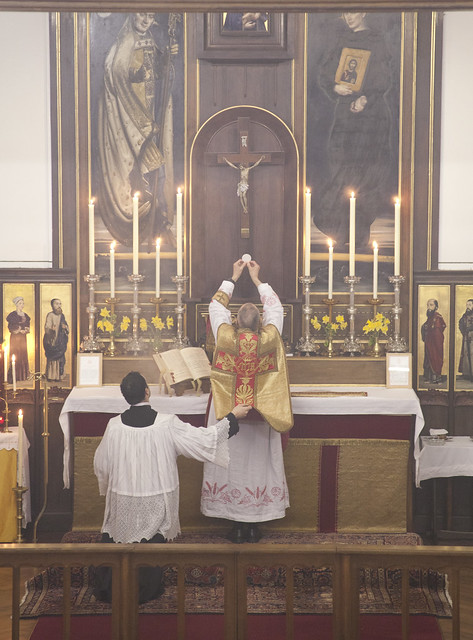 |
| The Elevation, under the gaze of St Gregory the Great and St Augustine of Canterbury. Patronal Feast of St Gregory & St Augustine's Church, Oxford. |
Friday, March 21, 2014
Congratulations to Bishop McMahon!

Bishop Malcolm McMahon of Nottingham (not be confused with Bishop Thomas McMahon of Brentwood, who is nearing retirement), is to be the new Archbishop of Liverpool.
Bishop McMahon is a Dominican, and was the first Ordinary (as opposed to Auxiliary Bishop), to celebrate the Extraordinary Form in his diocese. He did this in the Dominican church in Leicester, Holy Cross, some years ago. Since then he has celebrated Mass for the Latin Mass Society during last year's Priest Training Conference at Ratcliffe College, near Leicester. More photos here.
His appointment, following that of Fr Robert Byrne as an Auxiliary Bishop in the Archdiocese of Birmingham only a few days ago, is an indication that involvement with the Traditional Mass is not a black mark on one's record under Pope Francis.

Thursday, March 20, 2014
Trip to Lanherne
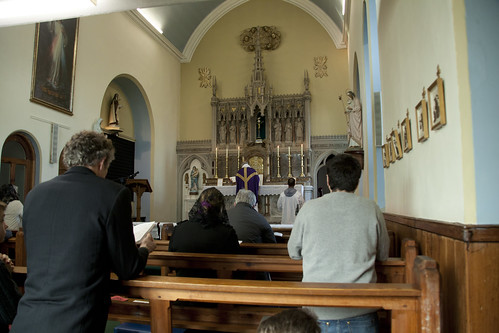 |
| Mass on Sunday: the Sisters are behind the grill and net curtain on the left. |
I take a brief break from my ongoing series of posts to put some photos of my recent (and first ever) trip to Lanherne Convent: that is, the former Carmel now occupied by a community of the Contemplative branch of the Franciscan Sisters of the Immaculate.
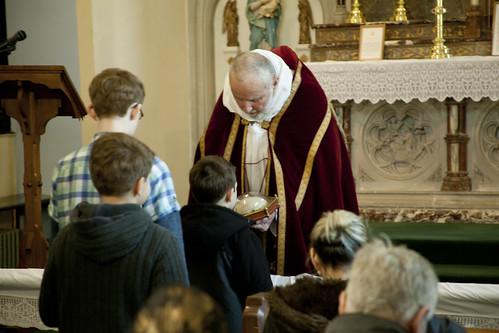 |
| Venerating a relic (the cranium) of St Cuthbert Mayne, a local saint. |
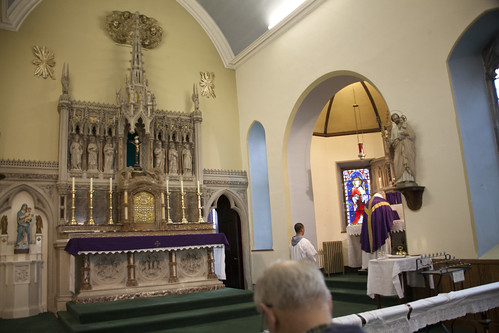 |
| Mass on Monday: the Sisters are now directly facing the Altar, and the laity looking side-on. |
The convent is rather large, but not easy to see from outside. And, obviously, I couldn't go inside. I did speak to the Superior in the 'Speaker Room', with the double grill.
 |
| The convent glimpsed from the back. |
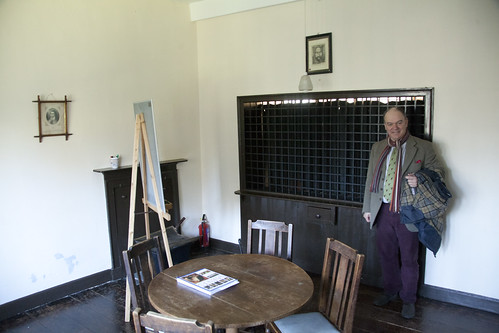
More photos.
Donate to the Friends of Lanherne here.
Wednesday, March 19, 2014
Orthodoxy and the Traditional Mass, Part 1
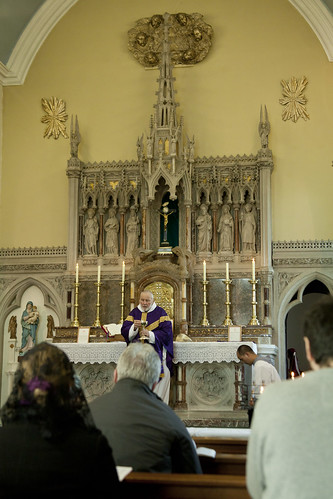 |
| Low Mass at the convent chapel of Lanherne |
Having cleared the ground of the idea that Traditional Catholics are disloyal, I am going to do a short series on the relationship between the Traditional Catholic movement and Orthodoxy.
There are people who like the Extraordinary Form, but have heterodox theological views. There are, of course, many people who are orthodox in faith who don't even know about the Traditional Mass, or know about it but don't particularly seek it out. It is nevertheless an observable phenomenon that Traditional Catholics tend to very orthodox, and, conversely, that heterodox thinkers within the Church tend to dislike the Traditional Mass. Indeed, Cardinal Ratzinger commented on the latter fact, linking hatred of the Vetus Ordo to dissent specifically about the sacrificial nature of the Mass.
I want to mention two reasons for this linkage, and one important consequence of it.
The first reason is, as with Cardinal Ratzinger's example, the texts of the Extraordinary Form emphasise a lot of the teachings which the most popular heresies of our day reject. This has now been set out at scholarly length by Lauren Pristas: if you don't want to believe this, buy her book about the reform of the Collects. The old collects, many of them being very old indeed, make repeated and very clear points about our need for grace, for example. The Holy Father is absolutely right to worry about Pelagianism in the Church - Cardinal Ratzinger, again, remarked that the texts of the Novus Ordo were open to Pelagian intepretation. But there are many such issues, the Real Presence, the reality of the Devil (another favourite topic of Pope Francis), even the theology of marriage (in the Nuptial Blessing), and the importance of penance and the intercession of the Saints.
The second reason is that the Traditional Mass represents continuity. It is is logically possible to accept the validity of the ancient Mass and reject the validity of the ancient teaching of the Church, or to reject the Mass and accept the teaching, but unless you have some strange and complicated reason to do either thing it is incongruous.
So here's the consequence. Liberals tend not only to dislike the Traditional Mass personally, but oppose anyone having access to it. This is something which is puzzling, but there is an explanation. They find the texts about grace and penance and the intercession of the saints embarrassing, not only for themselves but for the whole Church. They want them wiped from the Church's collective memory. But more deeply, they want to deny the continuity of the Church. They are opposed to the idea that anything worthwhile can be found in the Church's past. If they do look at the past, they prefer to look at isolated bits and pieces from the distant past, with which there is no lived continuity.
The reason is that in order to deny the Church's teaching you have to stop people appealing to the teaching and also to the lived experience of Catholics over recent centuries up to Vatican II. The recent centuries are the most useful, often, because they were struggling with the same problems as us: 'natural' theories of education, the theory of evolution, critical methods of interpreting the Bible, contraception, divorce, secularism. The liberals want to cut us off most of all from those parts of the Magisterium which are most useful. They want to destroy the prestige and authority of this teaching by ridiculing the Mass which went with it.
To be continued.
Saturday, March 15, 2014
Photos of Ash Wednesday
I've been having trouble with my computer, which particularly impeded my photographs. So I have a bit of a backlog. Here are some photographs of the Sung Mass we had for Ash Wednesday. It was extremely well attended, in the church of SS Gregory and Augustine in Oxford. It was celebrated by Fr John Saward and accompanied by the Schola Abelis. The photos are unusual (for me) since I (with the whole schola) was in the nave, not in the choir loft.
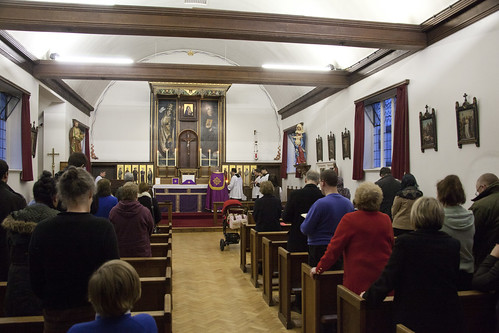
This is a boring photograph. You can't see the priest blessing the ashes. Actually, that make it rather interesting: this is how it has always been. We don't need to see it: it is between the priest and God. It is an example of the emphasis on 'ritual efficacy' in the EF: the words make an objective difference to the ashes, the effect on the congregation is secondary. Being able to see the blessing of the palms on Palm Sunday is an innovation of 1955.
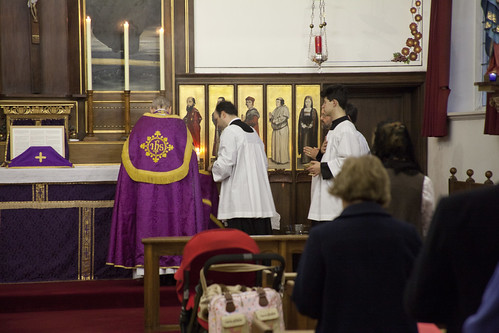
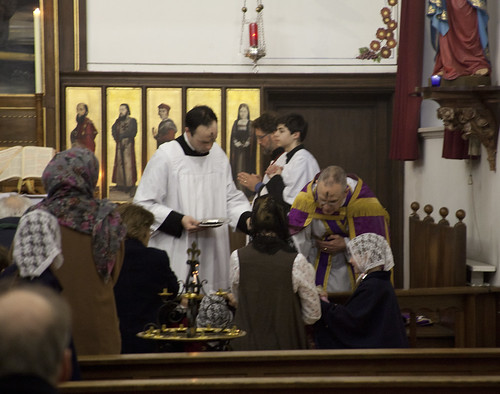
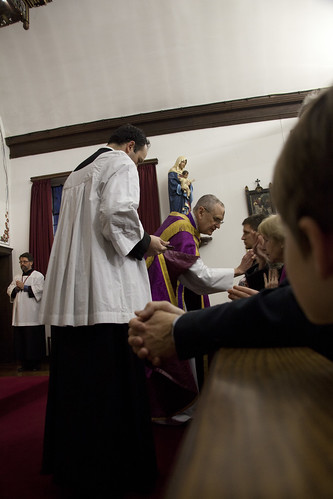

This is a boring photograph. You can't see the priest blessing the ashes. Actually, that make it rather interesting: this is how it has always been. We don't need to see it: it is between the priest and God. It is an example of the emphasis on 'ritual efficacy' in the EF: the words make an objective difference to the ashes, the effect on the congregation is secondary. Being able to see the blessing of the palms on Palm Sunday is an innovation of 1955.



Friday, March 14, 2014
Tolerating the Unacceptable: Same Sex Marriage, Part 2
In my last post I noted that the idea of 'tolerating' what we cannot 'accept', in relation to remarried divorcees, is not terribly satisfactory, since it creates a situation in which there are 'really' married Catholics, and 'tolerated' co-habiting Catholics. It has already been pointed out that if this 'toleration' is given to those in invalid marriages, then it would not seem logical or just not to extend it to cohabiting couples who have not attempted to enter any kind of legal marriage, and to polygamists. Even at the level of a pragmatic pastoral policy, it looks as though it may create more problems than it solves.
On the other hand, applying this to Same Sex Marriage (SSM) looks very attractive indeed, from the point of view of avoiding a confrontation with secular values. Without such a strategy the clash will be extremely difficult to manage: I emphasise this because it is important to understand the attraction of this proposal. The media has a well-established narrative, 'the Catholic Church hates gays'. Gay couples already make a point of presenting themselves for Holy Communion, identifying themselves with rainbow sashes to avoid any possible misunderstanding, in order to test the discipline. With SSM the sashes will be less necessary; the presentation of people in a public state of sin for Communion will happen every day; they will wear wedding rings, change their names, and call each other 'husband' or 'wife'. Many, many priests will give them Communion, out of what they will call 'compassion'. The Church's discipline will be the focus of ferocious pressure by lobby groups on the look-out for continuing discrimination against gay couples, discrimination which in practice denies them the full rights of marriage. It will take another step or two of legislation to make this a legal problem for the Church, but it is certainly going to be a political, social, and pastoral problem, a running sore in fact which will make it impossible for the Church's positive teaching about any subject, let alone marriage, to gain a hearing.
So let's not underestimate the problem. The proposed solution is glorious in its simplicity. If the Church chooses to 'tolerate' what it cannot 'accept', priests will be able simply to ignore the legal marital status of those coming up for Communion. We will all be able to pretend SSM does not exist. After all, Pope Francis has just said
Secular states want to justify civil unions to regulate different situations of cohabitation, pushed by the demand to regulate economic aspects between persons, such as ensuring health care. It is about pacts of cohabiting of various natures, of which I wouldn’t know how to list the different ways. One needs to see the different cases and evaluate them in their variety.
Sax Sex Marriage does not, after all, necessarily imply an immoral sexual relationship. Perhaps they just want to avoid inheritance tax.
But in fact this is beside the point. The same is true of those in illicit heterosexual unions, and there are ways of dealing with this without always insisting the couple obtain a legal divorce or even separate: they can undertake to live as 'brother and sister'. The status of a public sinner can be dealt with privately with a priest. The problem we are faced with is where the couple have no intention or desire to affirm before the priest that they are not in an immoral sexual relationship, but on the contrary want this relationship to be accorded public recognition by adopting the terminology and legal status of heterosexual marriage.
What would be the effect of the Church adopting the 'toleration' strategy? At the moment Canon 915 of the Code of Canon Law states:
To allow the 'toleration' strategy to be officially permissible, the second half of this canon would have to be expunged, or an indult created to waive it. Those in illicit marriages are 'obstinately persevering in manifest grave sin': sex outside marriage is grave, the public legal status of marriage makes it manifest and obstinate.
Such an indult, say for 'exceptional' cases, or leaving it more explicitly to the 'judgement of the pastor', without (we will be told) changing the Church's teaching on the Indissolubility of Marriage, might either lift the canon-legal obligation on priests to refuse Communion, or, even more easily, make that obligation completely unenforceable. The latter would no doubt be enough for practical purposes: as far as the public policy of the Church is concerned, as understood by the world's media, the prohibition on gay couples receiving Communion will have been lifted.
The problem, however, is that while the Supreme Legislator (the Pope) can always, in principle, change Canon law, he cannot change the Divine Positive Law or the Natural Law. Even if the canonical obligation were lifted completely, the moral obligation on priests, from these sources, would remain.
The key passage here is from St Paul (I Cor 11:27-29):
The key passage here is from St Paul (I Cor 11:27-29):
This passage from St Paul's First Letter to the Corinthians is divine revelation, and the facts it reveals about the nature of the Eucharist are facts established by Our Lord when He made the Eucharist: they are facts of Divine Positive Law. Our Lord made the Eucharist in such a way that it is beneficial only to those not in a state of mortal sin. This cannot be changed by the Church.
This means that it is wrong for a priest to give Communion to a person known to be a sinner, other things being equal. This follows from the priest's nature and vocation to care for the souls of the Faithful: to be indifferent to them would be a dereliction of duty. This is another fact, of course, of Divine Positive Law, related to the establishment of the Sacrament of Holy Orders.
Why, then, do priests not refuse Communion to those known only to them to be sinners? Because to do this would cause scandal to anyone else present, and would harm the good name of the sinner. These considerations have great weight in the Tradition. But when the sinner is 'notorious', scandal would be caused by giving the Communion. Notoriety, in short, allows the priest to exercise mercy and pastoral concern.
What is being proposed, therefore, is that the Church sacrifice the souls of these sinners for the sake of a better media image. Such a sacrifice is wrong on the basis not of Canon Law but of Divine Law. Any priest who knowingly gives Holy Communion to a public sinner is committing a grave sin, regardless of what Canon Law may say.
This means that the proposed policy is a disaster. But even from the public relations point of view another disaster looms, from a factor which liberals consistently ignore in such cases. That is that not all priests, and perhaps not all bishops and cardinals, will go along with this merciless policy. This may or may not be a high percentage, but it is perfectly clear that there will be a group of hold-outs significant enough to provide ammunition for the media and the gay lobby. What will happen to those priests?
We have a good idea of what will happen, because we have seen closely parallel cases. The bishop and the relevant people in the Curia will say, when asked, that these priests are not obliged to do this; perhaps even that they are not following guidelines. Catholic commentators, including many priests and even bishops desperate not to be tarred with the same brush, will be on hand to describe these priests as extremists and homophobes, unrepresentative of the Catholic Church in the 'era of mercy'. Since these priests will not be able to appeal to the Church's official disciplinary documents to support the claim that they are under a religious obligation to do what they are doing, it is very easy to see them coming under legal threat. Stripped of the (limited) legal and social protection of religious freedom, they will be accused of acting out of malice towards homosexuals. It is not difficult to imagine them ending up in prison, the condemnations of fellow Catholics ringing in their ears.
Thursday, March 13, 2014
Tolerating the Unacceptable: Same Sex Marriage: Part 1
Thinking about Cardinal Kasper's paper on reforming the Church's approach to the pastoral
treatment of Catholics who have remarried after divorce, I have been very puzzled about the idea
of 'tolerating what we cannot accept'.
At first glance it hardly seems satisfactory to say to remarried divorcees, who have been unable to get an annulment, even through a process which has been made less formal and legalistic, that their union is 'unacceptable', that is, adulterous, but that they can receive Communion anyway. We would be making these people into second-class citizens, excluded, if not from Communion, then from Confession, since they do not repent of their adultery, and from the Sacrament of Marriage, inasmuch as they cannot celebrate their new marriage in Church. This hardly seems like a good way to restore them to the sacramental life of the Church, and it hardly seems a status which they would relish. After all, these individuals have made a decision which presumably seems to them, subjectively, as their best option. Liberals who ignore the need either to form one's conscience or actually to resist temptation will tell us that they are, in fact, 'in good conscience', and justified in the 'internal forum'.
However, it occurs to me that this pastoral strategy may have another application: Same Sex Marriage (SSM). As SSM becomes established throughout the world, the Church is going to be increasingly confronted with those who, up until now, were simply private sinners - like everyone else - but are now public sinners, having taken on a public, legally binding, quasi-marital status, implying a sexual relationship. If a civil marriage after divorce, when the spouse is still alive and the first marriage is not annulled, is a public statement of an on-going adulterous relationship, one which the Church cannot (under the present rules) ignore, a Same-Sex Marriage is a public statement of an even more serious moral problem.
SSM presents a particular difficulty because there is no equivalent of annulment, something which could in principle regularise the union. No matter how debased the annulment process becomes, no-one is ever going to be able to claim that a Same Sex Marriage is sacramentally or naturally valid in Catholic terms. It will always be something the Church cannot accept. But if we establish a concept of 'tolerating' what we cannot 'accept', then it would seem we have a way forward. We can, at least, make a major concession to the individuals involved. A concession which, in its practical effect, would allow us to ignore the ramifications of Same Sex Marriage as far as Communion is concerned, and carry on treating those taking part in such unions as if they had not done so, but were still just private sinners, like everyone else, and aren't wearing wedding rings.
The suggestion may seem timely, in the immediate wake of SSM legislation in a large number of countries. If the Church does not come up with some work-around quickly, priests will be faced with applying the current rules to an increasingly significant number of people. If they do that, it will look very much, from a secular perspective, as though people are being refused Communion solely on the grounds of their sexual orientation. After all, they are no less 'married' than a heterosexual couple, according to the law of the land. And the Church as a whole will be forced into a situation in which, instead of being able to proclaim the beauty of marriage, she will have to spend all her time defending a disciplinary penalty directed at a particular group, who simply want to establish some public recognition of their love.
I will explain some of the disastrous ramifications of this solution tomorrow.
At first glance it hardly seems satisfactory to say to remarried divorcees, who have been unable to get an annulment, even through a process which has been made less formal and legalistic, that their union is 'unacceptable', that is, adulterous, but that they can receive Communion anyway. We would be making these people into second-class citizens, excluded, if not from Communion, then from Confession, since they do not repent of their adultery, and from the Sacrament of Marriage, inasmuch as they cannot celebrate their new marriage in Church. This hardly seems like a good way to restore them to the sacramental life of the Church, and it hardly seems a status which they would relish. After all, these individuals have made a decision which presumably seems to them, subjectively, as their best option. Liberals who ignore the need either to form one's conscience or actually to resist temptation will tell us that they are, in fact, 'in good conscience', and justified in the 'internal forum'.
However, it occurs to me that this pastoral strategy may have another application: Same Sex Marriage (SSM). As SSM becomes established throughout the world, the Church is going to be increasingly confronted with those who, up until now, were simply private sinners - like everyone else - but are now public sinners, having taken on a public, legally binding, quasi-marital status, implying a sexual relationship. If a civil marriage after divorce, when the spouse is still alive and the first marriage is not annulled, is a public statement of an on-going adulterous relationship, one which the Church cannot (under the present rules) ignore, a Same-Sex Marriage is a public statement of an even more serious moral problem.
SSM presents a particular difficulty because there is no equivalent of annulment, something which could in principle regularise the union. No matter how debased the annulment process becomes, no-one is ever going to be able to claim that a Same Sex Marriage is sacramentally or naturally valid in Catholic terms. It will always be something the Church cannot accept. But if we establish a concept of 'tolerating' what we cannot 'accept', then it would seem we have a way forward. We can, at least, make a major concession to the individuals involved. A concession which, in its practical effect, would allow us to ignore the ramifications of Same Sex Marriage as far as Communion is concerned, and carry on treating those taking part in such unions as if they had not done so, but were still just private sinners, like everyone else, and aren't wearing wedding rings.
The suggestion may seem timely, in the immediate wake of SSM legislation in a large number of countries. If the Church does not come up with some work-around quickly, priests will be faced with applying the current rules to an increasingly significant number of people. If they do that, it will look very much, from a secular perspective, as though people are being refused Communion solely on the grounds of their sexual orientation. After all, they are no less 'married' than a heterosexual couple, according to the law of the land. And the Church as a whole will be forced into a situation in which, instead of being able to proclaim the beauty of marriage, she will have to spend all her time defending a disciplinary penalty directed at a particular group, who simply want to establish some public recognition of their love.
I will explain some of the disastrous ramifications of this solution tomorrow.
Wednesday, March 12, 2014
More on the Roman Forum this Summer
The Summer Symposium takes place 30 June – 11 July 2014: now with added Patrimony
The Roman Forum's Summer Symposium, in the idyllic setting of a small town on Lake Garda in Italy, is a truly unique event: 11 days of talks and social activities, with daily Traditional Sung Mass, with some of the leading intellectuals of the Traditional Catholic movement: Dr John Rao, Christopher Ferrara, Mgr Ignacio Berrairo, and the President of the FIUV (and a long-time associate of the event), Mr James Bogle. For the first time, it the roster of speakers will include Fr John Hunwicke.
The Latin Mass Society is sponsoring two young people to attend the Symposium; these places have now been taken up. We have also sponsored the attendance of a young musician, Andrew Cichy, to lead the choir for the daily Traditional Mass which is a feature of the event.
Here's a nice plug from Michael Voris.
Tuesday, March 11, 2014
Silence in the Traditional Mass: video
Building on the FIUV Position Papers published on Rorate Caeli last year, we at the Latin Mass Society have started a series of short videos to introduce the issues in a very simple way. Having tackled Septuagesima (a position paper on this is in preparation), I can now present a video on Silence in the Liturgy.
The original posting of this paper on Rorate Caeli on this can be seen here. The Position Paper itself is only 1,600 words, plus footnotes. You can download a pdf here; see the whole set of publishes papers here.
The series of Position Papers is ongoing, I will be posting the next one, on the Pax, on Rorate Caeli in a couple of weeks.
The original posting of this paper on Rorate Caeli on this can be seen here. The Position Paper itself is only 1,600 words, plus footnotes. You can download a pdf here; see the whole set of publishes papers here.
The series of Position Papers is ongoing, I will be posting the next one, on the Pax, on Rorate Caeli in a couple of weeks.
Sunday, March 09, 2014
Mgr Loftus attacks Cardinal Nichols, again
 A while ago Mgr Basil Loftus attacked Archbishop Nichols, as he then was, for appealing for money (for a charitable group dedicated to this specific cause) to repair the fabric of Archbishop's House in Westminster. This weekend, he goes after him, this time by name, for defending the Church's discipline on Communion for those divorced and remarried.
A while ago Mgr Basil Loftus attacked Archbishop Nichols, as he then was, for appealing for money (for a charitable group dedicated to this specific cause) to repair the fabric of Archbishop's House in Westminster. This weekend, he goes after him, this time by name, for defending the Church's discipline on Communion for those divorced and remarried.
'Matters have
not been helped by Cardinal Vincent Nichols' recent comment that when he was a
youth there was a more reserved attitude to the Eucharist. Indeed there was.
But it cannot be relied upon to support in any way the exclusion of the
divorced and remarried from Holy Communion. John Paul II roundly condemned it
as "not so much a feeling as unworthiness as a certain ... lack of hunger
and thirst, which is also a sign of of lack of adequate sensitivity towards the
great Sacrament of love and a lack of understanding of its nature". (Dominicae
Caenae, III, xi)
...
'Such purely
juridicial considerations of marriage totally ignore its continuity, a
continuity which is indestructibly preserved until death, in the partners' love
for their children and grandchildren, and indeed for one another, and in the
continuing psychological and spiritual memory, or more accurately 'memorial',
of their conjugal union. Not only is the question of Holy Communion for the
divorced and remarried a positive consideration in its own right - it also
helps to focus minds on the often negative and harmful purported 'solution' of
marriage nullity.'
On the second quoted paragraph, Loftus' position, as far as it is possible to discern what it is, beggars belief. He thinks that Catholics should not seek annulments for (presumably, null) failed marriages, but are better off living in concubinage: a formalised adultery. This state, he goes on to say (referring to Cardinal Kasper's talk) should be 'tolerated' but not 'accepted': there is no question of remarriage in Church, or, presumably, sacramental absolution, but the parties should go to Communion in order to make their descent into Hell more secure... or something.
He claims that this was the practice of St Basil: that after 6 months penance an adulterer would be given Communion again. That I can believe: but not that St Basil said that during and after this penance the adulterer should carry on committing adultery, because it had become (as Loftus suggests) psychologically impossible for the 'penitent' to stop. I should like to have been around had this argument ever been put to the great saint.
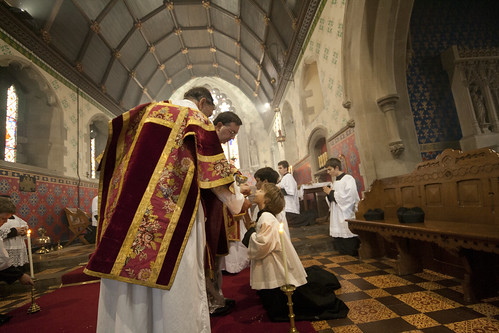
The first paragraph represents what I think must rank as one of the top handful of manifestly dishonest things Loftus has written: and there is a very strong field. It goes beyond being grossly misleading, and actually involves a lie. This can easily be shown by giving a longer quotation from Bl Pope John Paul II, Domicae Cenae 11:
Moreover our Catholic communities
certainly do not lack people who could participate in Eucharistic Communion and
do not, even though they have no serious sin on their conscience as an
obstacle. To tell the truth, this attitude, which in some people is linked with
an exaggerated severity, has changed in the present century, though it is still
to be found here and there. In fact what one finds most often is not so much a
feeling of unworthiness as a certain lack of interior willingness, if one may
use this expression, a lack of Eucharistic "hunger" and
"thirst," which is also a sign of lack of adequate sensitivity
towards the great sacrament of love and a lack of understanding of its nature.
However, we also find in recent
years another phenomenon. Sometimes, indeed quite frequently, everybody
participating in the eucharistic assembly goes to Communion; and on some such
occasions, as experienced pastors confirm, there has not been due care to
approach the sacrament of Penance so as to purify one's conscience. This can of
course mean that those approaching the Lord's table find nothing on their
conscience, according to the objective law of God, to keep them from this sublime
and joyful act of being sacramentally united with Christ. But there can also
be, at least at times, another idea behind this: the the life of our
communities to lose the good quality of sensitiveness of Christian conscience,
guided solely by respect for Christ, who, when He is received in the Eucharist,
should find in the heart of each of us a worthy abode. This question is closely
linked not only with the practice of the sacrament of Penance but also with a
correct sense of responsibility for the whole deposit of moral teaching and for
the precise distinction between good and evil, a distinction which then becomes
for each person sharing in the Eucharist the basis for a correct judgment of
self to be made in the depths of the personal conscience. St. Paul's words,
"Let a man examine himself,"(64) are well known; this judgment is an
indispensable condition for a personal decision whether to approach Eucharistic
Communion or to abstain.
The lie is that Loftus claims that Pope John Paul was talking about the old attitude, connected with what Cardinal Nichols remembers from his youth, ie 40 or so years ago, when he says 'a lack of Eucharistic "hunger" and "thirst," which is also a sign of lack of adequate sensitivity towards the great sacrament of love and a lack of understanding of its nature'. He isn't: having just mentioned in passing the older attitude, which was connected with an 'exaggerated severity', he is now talking about an attitude which is seen in the post-Conciliar era, something he was aware of as current at the time of writing (the document dates from 1980).
What is grossly misleading is to omit to mention that, although Pope John Paul wants to oppose the spiritual ennui which replaces the hunger and thirst for the Eucharist which is the healthy attitude, he immediately goes on, at greater length, to condemn the opposite and more widespread problem, of people going up to Communion regardless of their spiritual state. Quite clearly John Paul II, exactly like Cardinal Nichols, can see that something good has been lost from the past when people took the reception of Communion more seriously, even if in the past this was sometimes 'exaggerated'. Now we have gone to the opposite, and much more dangerous, extreme. It is no longer a matter of missing out on spiritual opportunities, but of plunging more deeply into grave sin.
Loftus' complete lack of intellectual integrity is a warning to everyone reading about this debate. The liberals' attempt to force open the Church's discipline on marriage and communion has an air of desperation. They are not interested in a thoughtful discussion, but at forcing this through, and they will stop at nothing to do so. Loftus article suggests why this might be:
 'the average age of bishops and theologians who campaign on their [remarried divorcees] behalf is increasing. Men like Ladislaus Orsy who have done so much to keep this issue alive are now in their 90s. Even octogenarians such as Walter Kasper will "be cut off, and fly away" before many of today's younger people are fully fledged. So, yes, the need for young blood in the theological fight for mercy is urgent.'
'the average age of bishops and theologians who campaign on their [remarried divorcees] behalf is increasing. Men like Ladislaus Orsy who have done so much to keep this issue alive are now in their 90s. Even octogenarians such as Walter Kasper will "be cut off, and fly away" before many of today's younger people are fully fledged. So, yes, the need for young blood in the theological fight for mercy is urgent.'
Yes, Mgr: the clock is ticking, and time is not on your side.
Photos: the younger generation receiving Communion at the St Catherine's Trust Summer School. I don't think they will be flocking to Loftus banner any time soon.
Photos: the younger generation receiving Communion at the St Catherine's Trust Summer School. I don't think they will be flocking to Loftus banner any time soon.
Saturday, March 08, 2014
The Church, the Jews, and the Piranha tank
 I am pleased to see that the lay theologian Dr John Lamont has published an article on the Jews and the Church: 'Why the Jews are not the Enemies of the Church' in the Homiletic and Pastoral Review.
I am pleased to see that the lay theologian Dr John Lamont has published an article on the Jews and the Church: 'Why the Jews are not the Enemies of the Church' in the Homiletic and Pastoral Review.Dr Lamont is extremely sympathetic to the Traditional Catholic cause, and this is by no means an attack on that. It is a corrective, however, to claims made by some attached to the Traditional Mass, and specifically to some remarks of Bishop Fellay, Superior of the Society of St Pius X. I do not regard the SSPX, as an organisation, as anti-Semitic either in theory or practice: anyone who has been paying attention will have noticed that the SSPX has the habit of ejecting members who have clearly anti-Semitic views. What is evident, however, is that there is a current of conspiracy-theory thinking which can be found in Traditional Catholic circles which can easily lend itself to anti-Semitism.
Dr Lamont's article on the Homiletic and Pastoral Review website is already generating the kinds of comments which give Traditional Catholics a bad name: anyone addressing these matters on the internet steps into a tank of piranhas. These commenters - perhaps they will make an appearance on this blog as well - are not representative of the Traditional Catholic movement. Since they are attracting the attention of many who are open-minded about or hostile to the Traditional Catholic cause, I believe that it has become dangerous simply to ignore them. It is time the rest of us made it clear that we do not agree with them, and why.
The same task falls to those on both the political left and right in the UK, the fringes (and not just the fringes) of whose movements attract their own versions of the unpleasant views which can be found on the fringes of Traditional Catholicism.
I also think it is important to set out the reasoned case, from a perspective friendly to Traditional Catholicism, against the key claims of the conspiracy-theory types, since this case involves historical facts which are not all widely known even by those not at all attracted by the conspiracy theories.
-------------------------------
Here are some extracts (in red) of, and paraphrasing summaries from, the article.
The reason why Rabbinic Jews are not enemies of the Church can be put briefly. Such Jews do not seek to convert Christians to Judaism, or to prevent non-Jewish Christians from exercising their faith. They only refuse to become Christians themselves, which does not suffice to make them “enemies” of the Church.
-----------
Rabbinic Judaism is something which, properly speaking, arose only after the destruction of the Temple in 70 AD. Furthermore, as a result of the massive pogroms against Jews carried out by the Romans in the wake of the various Jewish Revolts, Rabbinic Judaism derives overwhelmingly from Jewish sources outside the Roman Empire, notably in Babylon. The Jewish antecedents of Rabbinic Judaism who lived in the time of Our Lord, therefore, were many hundreds of miles away from Jerusalem when He was crucified.
The statements of St. Peter condemn those Jews who were themselves personally involved and responsible for the death of Christ in bringing about his crucifixion. The term “adversary,” that is used by St. Paul, is applied to the Jews who sought to prevent the first Christians from preaching the Gospel to the Gentiles. It is this attempt to prevent the preaching of the Gospel that constitutes the Jews as “enemies” of all men in St. Paul’s eyes since they are trying to prevent the message of salvation from reaching the rest of the human race. Since Rabbinic Jews make no effort to prevent the preaching of the Gospel to Gentiles, and the founders of Rabbinic Judaism lived some time after the death of Christ, these condemnations cannot be applied to them.
--------------
When the Talmud was burnt in Paris at the instigation of [the Jewish convert to Catholicism] Nicholas Donin, French Jews appealed to the Pope, who judged that it could be permitted, if it was expurgated of any anti-Christian remarks. A similar judgement was made by the Council of Trent. A commission of Jews approached the Council to request that it rule that the Talmud could be printed. The Council passed their request on to the Congregation for the Index, which again ruled that it could be printed if any anti-Christian statements were removed. This evaluation of the Talmud was more positive than that given to the works of Luther, Calvin, Peter Abelard’s Introduction to Theology, and Samuel Richardson’s Pamela – all of which were banned in their entirety by the Church.
---------------
“Because Rabbinic Jews deny the doctrine of the Trinity, they do not believe in the same God as the Christians.” The claim makes the mistake of inferring the psychological state of the believer from the logical consequence of his beliefs. It is true that since God is necessarily a trinity of persons, it necessarily follows that any being that is not a trinity of persons is not God. However, it is not true that every believer accepts all the logical consequences of his beliefs, simply because they do not always draw these logical consequences; and, indeed, are not capable of drawing all of them, since these consequences will be infinite in number. In the particular case of inferring that no being who is not a trinity of persons is the true God, it is only Christians who are capable of making this inference; the belief that God is necessarily a trinity of persons is needed to make it, and this belief can only be acquired through an act of Christian faith. Thus, from the facts that the Jews reject the doctrine of the Trinity, and that the denial of this doctrine entails that the true God does not exist, we cannot conclude that Jews do not believe in the existence of the true God.
-------------------
However, the Jewish organizations who insist that the Church should accept that the Mosaic law is still valid for Jews, are not representative of Jews as a whole. Most religious Jews are realistic enough to understand that the Church is not going to change her fundamental teachings, and are content with a vigorous rejection of anti-Semitic hatred and discrimination by Catholics. In defence of these Jewish organizations, it should be said that they are not necessarily well-informed about Christian thought, and that they have been assured, by some individuals with high positions in the Church, that Catholics no longer consider that they need to be saved by belief in Christ. They naturally take these assurances to correspond to what Catholic teachings now assert. When they are told that this is not, in fact, the case, they consider this to be an attempt to cheat them by going back on prior agreements. Some apologies are owed to them for having been given false assurances. The ecclesiastics who gave these assurances sought to use Catholic-Jewish relations as a pretext and disguise for advancing their own theological agenda, which was one of modernist promotion of all religions as good, and as paths to salvation. The Jews who accepted these assurances got caught up in an internal game of subversion of the Church, which was not their objective.
Thursday, March 06, 2014
Radical trads spoiling it for everyone?
 |
| High Mass in Westminster Cathedral. |
The favoured explanation of what went wrong in the Fisher More College affair, among those (you know who you are) who wish to support the banning of the Traditional Mass by the bishop, now seems to be that this is a case of extremist supporters of the Traditional Mass spoiling things for everyone: by linking the Vetus Ordo with extreme views, they left the bishop no choice but to prohibit it. I don't know if this is Bishop Olsen's view, and unless they have inside information on his state of mind - which they do not claim to have - neither do they. But we have all heard the argument before. Oh boy, have we. At the end of this post I will quote the locus classicus.
The policy, though familiar, is both self-defeating and hypocritical.
It is self-defeating because severe restrictions on the EF confirm the suspicions of those who think that, because there has been such a radical discontinuity in the theology of the Church with Vatican II, the theology of the Old Mass directly contradicts the official theology of the post-conciliar Church. Unwillingness to allow celebrations of the ancient Mass suggest that those in charge don't agree with it, and don't think it should be allowed to influence the way people think and pray.
This is given further support when the EF is specifically not allowed for students and young people, or in the context of religious orders which are successful and are spreading. Those who make such restrictions appear to want to stop the theological ideas implicit in the old Missal to infect new generations and new places, and are sometimes quite happy (or at least, a lot happier) to allow the Traditional Mass to be celebrated for the older generation.
This is not a wild-eyed conspiracy theory. It reflects the openly stated views of the more extreme liberals. Cardinal Ratzinger himself attributed opposition to the celebration of the Traditional Mass to a widespread rejection of the theology of Sacrifice as understood by the Council of Trent. The TLM was a 'most intolerable contradiction' of their (heretical) views. Ratzinger's call for the liberation of the ancient Mass, which he subsequently brought about at Pope, signalled that he had no problem with the theology of Trent, and that the Church as a whole has no problem with it. This was the necessary first step on what should be a process of the healing of discontinuities, real and perceived.
When bishops, religious superiors and indeed priests consider requests for the Traditional Mass, they would indeed do well to consider the effect that granting such a request will have on those supporters of the Mass who are tempted by the claims of radical discontinuity. Will refusing permission for the Vetus Ordo strengthen such temptations, or weaken them? The question answers itself.
The idea, in short, that denying people the Traditional Mass is an effective way of combatting the more extreme claims of some traditionalists is clearly false. The people making this argument simply can't have thought it through. It may be a way of punishing them - sure, and everyone else who would have benefited from the celebration. But in the Church punishments should be medicinal: they should aim at making things better. A punishment which makes things worse is just vindictive; it has no place in the Church.
Remember also that in giving permission, those exercising authority take control. They can determine who the celebrants will be. They can bring congregations out of private homes and irregular Mass centres. They can be visited by the Bishop, they will receive Episcopal letters to be read to the congregation. For a parish priest, bishop, or religious superior to prefer the Traditional Mass to be available only outside the official structures of the Church is... well let's just say it is extremely strange.
So the idea that the EF must sometimes be stopped because of 'extremists' is self-defeating. It is also hypocritical.
This is because of the obvious parallel with liturgical practices in the Novus Ordo. Think about when a bishop allows Altar Girls, Communion in the Hand, Communion Under Both Kinds on Sundays, and 'instituted' Extraordinary Ministers of Holy Communion: these all, remember, need the permission or intervention of the Bishop, and do so because of the dangers in them which were recognised explicitly when Rome gave permission for them. If the bishop were to ask himself: are these practices going to give comfort and support to radical liberals in the diocese who wish to undermine the teaching of the Church? the answer will very often be a very clear 'yes'.
Very little googling is needed to see liberals who want the ordination of women instrumentalising the permission for Altar Girls for their ideological ends. The connection between practices in which the Blessed Sacrament is treated with less reverence, and the undermining of the doctrine of the Real Presence, is obvious, and again these things are used by radical liberals to advance their theological agenda. It would be easy to give many more examples involving liturgical abuses which are in practice tolerated.
Do the bloggers who talk sadly about how those dreadful radical trads have made necessary the banning of the Traditional Mass in one place or another, do they go on to say that innumerable practices in the Novus Ordo have been made intolerable because of the way these are used by clearly heretical liberal extremists to further their goals? No doubt these bloggers don't entirely approve of these practices. But a sense of urgency and obviousness about how they should be immediately banned, regardless of the pastoral collateral damage, is strangely absent. They are, in short, applying different standards to traditionalists than they demand for everyone else.
Do the bloggers who talk sadly about how those dreadful radical trads have made necessary the banning of the Traditional Mass in one place or another, do they go on to say that innumerable practices in the Novus Ordo have been made intolerable because of the way these are used by clearly heretical liberal extremists to further their goals? No doubt these bloggers don't entirely approve of these practices. But a sense of urgency and obviousness about how they should be immediately banned, regardless of the pastoral collateral damage, is strangely absent. They are, in short, applying different standards to traditionalists than they demand for everyone else.
But of course the parallel is not perfect. Because although banning the Traditional Mass is clearly counterproductive in opposing the claims of discontinuity used by extremists attached to the EF, banning the practices which are so useful to the projects of extremist liberals would not be counter-productive. The liberals' arguments make use of the fact that the practices in question have been officially approved. Again and again they say: Altar Girls have been officially approved, and this shows that that the traditional position on the role of women was just time-bound misogyny; any day now the Church must and will approve women priests. If Altar Girls were banned in more dioceses, this argument would lose its force.
To summarise: the argument that the official Church is today in radical discontinuity with the Tradition is strengthened by banning the TLM; the argument that soon the Church will allow the ordination of women and give up on the Real Presence would be weakened by banning the above-noted practices of the Novus Ordo which, it would seem, there is absolutely no appetite on anyone's part to ban. The claim that radical trads have to be slapped down by stopping celebrations of the Traditional Mass is, then, not only self-defeating but also hypocritical.
--------------
To summarise: the argument that the official Church is today in radical discontinuity with the Tradition is strengthened by banning the TLM; the argument that soon the Church will allow the ordination of women and give up on the Real Presence would be weakened by banning the above-noted practices of the Novus Ordo which, it would seem, there is absolutely no appetite on anyone's part to ban. The claim that radical trads have to be slapped down by stopping celebrations of the Traditional Mass is, then, not only self-defeating but also hypocritical.
--------------

Here, as promised, is the classic expression of this argument, that moderate traditionalists should be punished for the misdemeanors of anyone who likes the Traditional Mass who expresses extreme views. It is from Bugnini's The Reform of the Liturgy pp295-7, talking about the very earliest days of the implementation of the Novus Ordo Missae.
'Not all traditionalist groups accepted the extreme conclusions of the most fanatical. Some [Eric de Savanthen and the FIUV] limited themselves to petitioning that "[the Traditional Mass] may have its place among the universally recognised rites for the celebration of Holy Mass." These groups regarded the Holy See's rejection of the petition as excessively harsh.'
...
'If there had not been the danger of seeming to approve the opposition between the Tridentine and Pauline Missals, as though the former, unlike the latter, was a symbol of orthodoxy, the Holy See would certainly have taken a more lenient attitude.'
That's right: kick the cat to punish the dog.
Subscribe to:
Posts (Atom)




